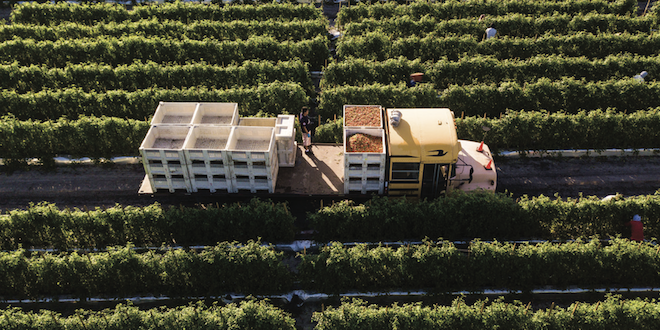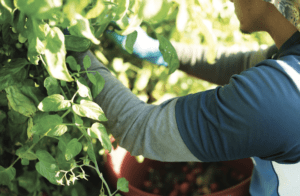

Jul 14, 2022Lipman Family Farms sees sustainability through breeding, growing
Lipman Family Farms includes sustainability throughout its North American production. While the Immokalee, Florida, family operation has expanded from growing tomatoes into other crops and related operations, it remains a grower at heart.
Lipman has grown from a small family business to a large-scale grower that thinks about the future by adapting with new growing methods and technology. It also creates partnerships with small and medium growers to provide locally sourced produce.
From its humble beginnings as a tomato buyer in New York to today’s vertically integrated network of services throughout North America, the company operated by fourth generation owners possesses a long history of employing inventive ways of growing tomatoes and other vegetables.
“At Lipman, we’re always looking for new ways to improve our practices and bring innovative solutions to our customers,” said Elyse Lipman, chief strategy officer.
The Lipmans began growing tomatoes in Florida in the 1950s. It gradually added a full line of tomato varieties and dry vegetables, including peppers, cucumbers, squash, green beans and mini sweet peppers. Lipman also incorporated growing methods outside of field growing.
Tomato varieties include mature greens, round reds, romas, grapes and cherries. In recent years, Lipman introduced Crimson tomato varieties, which maintain their shape and bold red colors, offering the taste of summer throughout the year.
Farming legacy
The seeds for Lipman’s family business vision were planted in the 1930s when Max Lipman, a European Jewish immigrant, visited produce purveyors and discovered a tomato stand in the Washington Market in Lower Manhattan, where the World Trade Center buildings would later be erected.
In the early 1940s, Max and his wife, Ella, relocated to Florida where he planned to open a small vegetable wholesaling business. In 1950, Max bought land near Immokalee to begin growing and selling tomatoes commercially. Six L’s Packing Co. was named for Max’s three sons and three sons-in-law who partnered in the business with him.


Since then, Lipman has entered new areas of business, including repacking, distribution and fresh-cut processing. In 2011, Bill Lipman, the last of the original company founders, died. That year the company changed its name from Six L’s to Lipman Family Farms.
During the past decade, the Lipman Local program has expanded acreage and increased supply. The program provides East Coast growers, including from New Jersey, Virginia, North Carolina and South Carolina, plus California, with fair returns, Lipman said.
“Locally-sourced produce is becoming more important, and demand is predicted to continue,” he said. “Lipman’s vast national distribution network enables local growers to sustainably reach communities, reduce food waste and minimize cross-country shipping impacts. Our longstanding local partnerships have provided fresh produce with reduced transit miles to the store, offering the longest possible shelf life for our customers.”
Variety improvement
To maintain variety quality, Lipman Family Farms invests in continuous crop improvement. A longtime in- house research and development staff develops custom varieties. Lipman’s scientists concentrate on improving varieties for higher flavor and color throughout the growing season. The varieties are also bred for other factors, including withstanding new pests and diseases. The R&D staff also works with Lipman’s farms and greenhouses for more efficient harvesting techniques.
Lipman’s Accelerator Program features dedicated staff members who research and implement new ways of operating and improving operating efficiencies to reduce inputs and resource usage.
Computer-controlled drip irrigation is an example of technology pursued through the Accelerator program. The system, which automatically adjusts for environmental factors such as precipitation, humidity and evapotranspiration, is installed in all Lipman farms. It has reduced water consumption for irrigation by 50% to 70%.
Through the Lipman Local program, employees work with smaller farms and test new tools for data collection to ensure high-quality, local produce is available year-round.
In 2011, Lipman began growing organics and in 2016 focused more on the segment by introducing the Grown True organic brand.


Organic, CEA ventures
“The demand for organics is continuing to grow,” Lipman said. “Last year, we noticed an increase in demand from our customers and decided to expand our compostable packaging line to not only meet the demand for organic produce, but also for the demand for sustainable packaging.”
In 2018, the grower entered controlled-environment agriculture (CEA), when it purchased Huron Produce in Canada. The greenhouse varieties are grown in hundreds of acres throughout North America.
The acquisitions advance Lipman Family Farms’ product development and growing technology. “Innovation allowed us to grow into the company we are today and helps us stay ahead,” Lipman said.
Over more than 80 years, the family’s business has changed in many ways. Workers are an extended family of associates, and charitable programs show the company’s dedication to the communities it serves.
“We are ‘Good from the Ground Up’ because our people are,” Lipman said. “It all starts with a world-class team that makes excellence in all we do our sole focus. We are inspired to create growth that nourishes everyone.”
– Doug Ohlemeier, assistant editor; Photos courtesy of Lipman Family Farms














